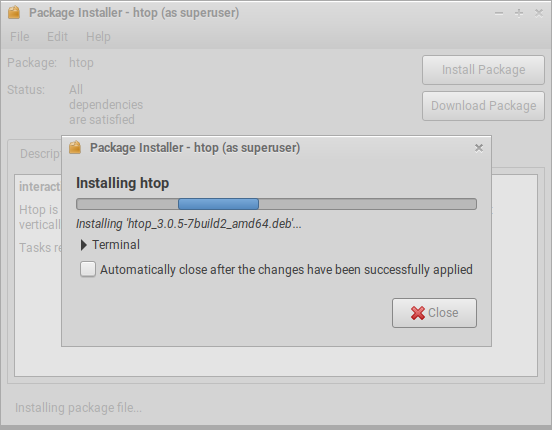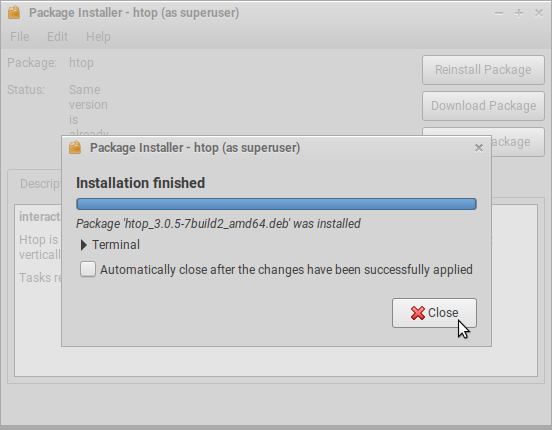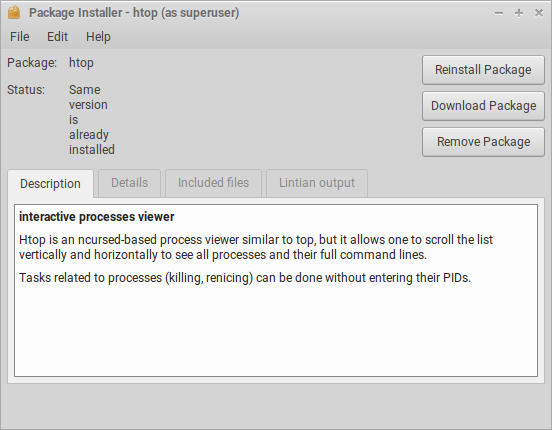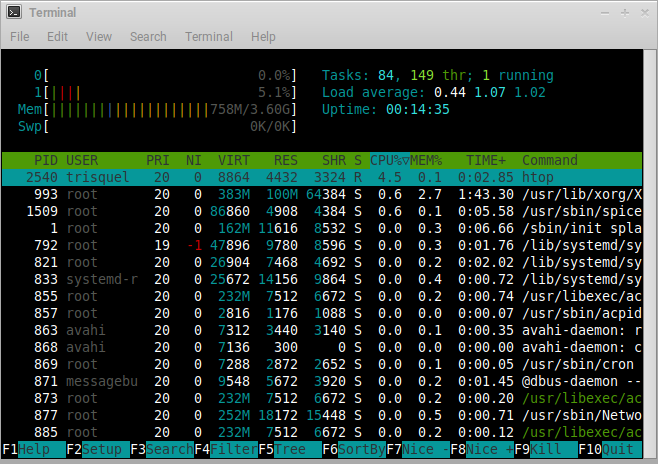Instalación de paquetes sin conexión a Internet
Instalación manual de un paquete con GDebi
Antes que nada: No confíe ciegamente en paquetes fuera del repositorio de Trisquel. ¡Quien lo creó podría haber incluido malware!
GDebi se instala por defecto en Trisquel GNU/Linux. GDebi es una herramienta sencilla para instalar archivos DEB. Permite instalar paquetes DEB locales resolviendo e instalando sus dependencias.
Uso de la interfaz gráfica de GDebi
En esta demostración, instalaremos htop que ya descargamos.
- Abra la carpeta con el paquete DEB que quieres instalar y haz doble clic en él.
o
- In the Main Menu go to Other→GDebi Package Installer
- and select File→Open to select the DEB package

- If no error arises (e.g., unmet dependencies), click on the "Install Package" button.

- The package will now be installed

- Select "Close"

- After GDebi Package Installer finished the installation the window will look like this:

- You can now start the Application from the Main Menu, if possible
In our demo we are starting htop, the application we have installed. It will look like this:

Using GDebi in a terminal
If "gdebi-core" is installed or if you prefer the terminal (here assuming that the working directory contains "package.deb", to be substituted by the actual name of the DEB file): $ sudo gdebi package.deb
If "gdebi-core" is not installed, install it with the package manager when the system is online. If the system is offline for good, bring on it the DEB package of "gdebi-core" e.g., using a USB stick:
Then install it with the following command (here assuming that the working directory contains gdebi-core_0.9.5.7+nmu2_all.deb for Trisquel 11): $ sudo dpkg -i gdebi_0.9.5.7+nmu6_all.deb
Then use the 'gdebi' command to manually install any package (including "gdebi" to have its GUI). Notice that the use of 'sudo dpkg -i' to install any package is not recommended because it does not resolve unmet dependencies, i.e., it will install broken packages if some dependency is not installed. gdebi-core's dependencies are already installed. Even "trisquel-minimal", which provides a minimal console environment, depends on them.
However, if you meet unmet dependencies after that, and if your Trisquel have an internet access somehow, this command will resolve unmet dependencies automatically from Trisquel official repository:
$ sudo apt-get -f install
If your system is offline for weeks or more, GDebi is not the "proper" solution to administrates it. The proper solution is below.
Using a local apt repository
To create your own apt repository, that you can use later with apt, follow these instructions:
- Create a directory for your own apt repository
mkdir ~/apt-local-repository/
- Append "deb [trusted=yes] file:/home/trisquel/apt-local-repository/ ./" to your sources.list where "trisquel" is your user name like this:
sudo echo "deb [trusted=yes] file:/home/trisquel/apt-local-repository/ ./" | sudo tee -a /etc/apt/sources.list
- Place the deb packages in ~/apt-local-repository
or
- To download a package when you are online along with its dependencies, run:
cd ~/apt-local-repository; sudo apt-get --download-only -o=dir::Cache="./" -o=dir::Cache::archives="./" install package-namewhere package-name is the package you want to download.
- Generate package list which can be recognized by apt by running:
cd ~/apt-local-repository/; sudo apt-ftparchive packages . > PackagesNow, when you are offline, you can remove all online repositories in /etc/apt/sources.list and:
- Update your package list by running:
sudo apt updateTo install a package from your own repository just type:
sudo apt install package-namewhere "package-name" is the name of the package you want to install
For later use, place the packages you want in "~/apt-local-repository/", update your package list and install the packages from your repository.

